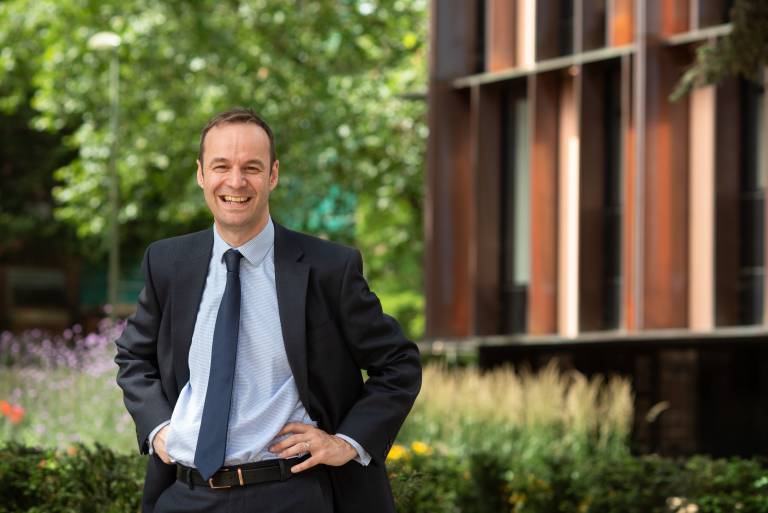The Wolfson Foundation: funding for a better future
Why Paul Ramsbottom, Chief Executive of the Wolfson Foundation, believes UCL is changing the world.

18 July 2021
What gets Paul Ramsbottom out of bed in the morning is a drive to improve society.
For over a decade, he’s been the chief executive of the Wolfson Foundation. In that time, he’s seen how philanthropic support can power some of the biggest advancements in science, healthcare and the arts. He says: “Using privately generated money to do really interesting things in society is a wonderful, exciting way to spend your working life.”
The Wolfson Foundation is a major, independent grant-making charity that allocates upwards of £35 million a year to fund societal change through research and education in the UK. Established in the 1950s by businessman and philanthropist Sir Isaac Wolfson, who made his wealth as the managing director of Great Universal Stores, its grants have been behind some of the biggest scientific breakthroughs in recent history and allowed a generation of researchers to thrive.
Paul says: “UCL received some of our earliest awards in the first two or three years of Wolfson being founded, and it has received funding certainly every decade and more or less every year since then. The Foundation was established to fund science and education, paired with excellence, so UCL was always a natural partner.”
Supporting on different levels
As UCL academics carry out vital research across a vast landscape of medical, scientific and environmental disciplines, it gives philanthropic organisations like the Wolfson Foundation the chance to support multiple projects at different levels.
“To put it in quasi-legal language, it's genuinely fulfilling our charitable objectives by working with UCL,” says Paul. “It's also rewarding to look at the institution through the different lenses of our various funding programmes – such as research infrastructure, postgraduate and early career researchers, and museums – which provides different layers to our fruitful funding relationship.
“Along with the major infrastructure grants, we also fund people (including recipients of postgraduate scholarships), partner with institutions like the British Academy and the Royal Society, and have programmes in place for museums and galleries. The Grant Museum at UCL, for example, has seen a lot of funding over the years.”
Powering the breakthroughs
During UCL’s recent It’s All Academic Campaign, the Foundation awarded £20 million to create the UK’s only dedicated clinical research facility for neurodegenerative research – The Leonard Wolfson Experimental Neurology Centre.
Within its first three years, the centre made a major breakthrough in the treatment of Huntington's Disease. It is a moment that Paul remembers well. He says: “Although the research that led to the breakthrough had been ongoing before we pledged funding, there was no doubt that our investment meant that the whole thing could be done at a quicker pace. Although the subsequent clinical trials have not gone as hoped, this is still an area of exceptional promise - and the research offers hope for sufferers of this devastating disease.”
Since then, UCL has been able to raise further funds for research into neurological disease understanding and treatment, using the initial investment made by the Foundation as the catalyst for subsequent philanthropic support.
Paul says: “Although our funding process is open, friendly and transparent, it’s also rigorous – so then when the funding goes in, it's a mark of quality. When the funding was made to the Neurology Centre, one of the arguments we also expressed was that as an area neuro-degeneration generally had been seriously underfunded compared to, say, cancer and cardio-vascular. So it's been really gratifying in the last 10 years to see that so much further investment has been made, particularly through the UK Dementia Research Institute (UK DRI), into neurology at UCL and beyond.
“UCL is without question, one of the preeminent international leaders in this field.”
Looking ahead
In a world that’s still trying to find its way through the current pandemic, Paul believes that the role of philanthropy is more important than ever. “There is this sense that things aren't going back to how they were before,” he says. “So, what can private money do to help organisations think about how we do things differently? We're now beginning to see philanthropists focus less on immediate emergency response, and more about how we emerge from this.”
For Paul, supporting institutions like UCL has a transformative energy, and this bodes well for future investment. “We're funders of education, and within that we want to finance individuals and create infrastructure that will affect societal change. That's the driver – the end beneficiary. Research is such a powerful thing for philanthropy to be funding,” he says. “So there really could be no better place than to put your money into a research university working at the highest international quality like UCL.
“At UCL, you have got brilliant minds that are engaged in the influential questions facing society, whether those are medical questions or those related to the environment, or social justice issues, and those minds are providing debate, research and, most importantly, solutions to our big issues.”
- Learn more about the work of the Leonard Wolfson Experimental Neurology Centre.
Top: Paul Ramsbottom OBE photographed by John Cairns.
 Close
Close

